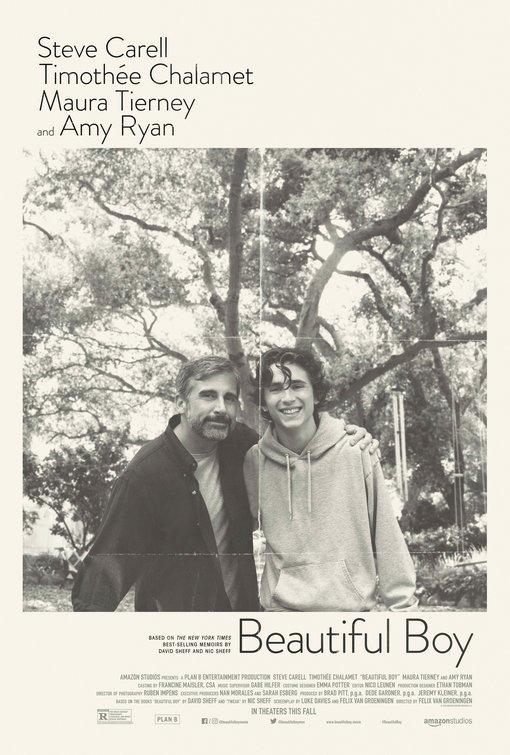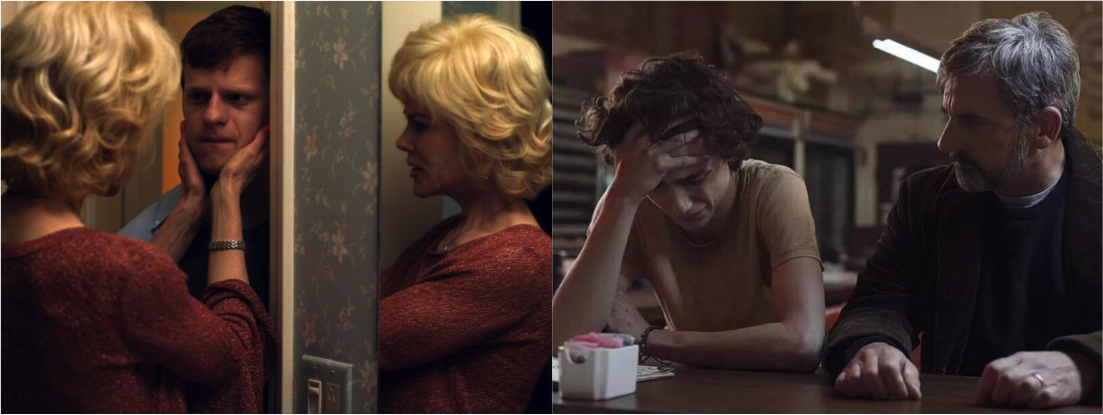Boys, Interrupted
Perhaps it is a sign of the zeitgeist, but this year-end Awards season yields two films starring hotly tipped young actors as titular ‘boys’ confronting challenging situations en route to adulthood. Is this a hopeful sign that society as a whole is beginning to warm up to the idea that boys – and men – will benefit from being aware, learning about and talking openly about mental and emotional health issues?
In Beautiful Boy, based on a pair of memoirs, Steve Carrell plays journalist David Sheff, a father blindsided by his teenage son, Nick’s, seemingly sudden and inexplicable descent into meth addiction. As played by Timothée Chalamet, Nick comes across as a fully realized, three-dimensional person whose thoughts and actions cannot be simplified into an easy explanation – by turns sensitive, scheming, charming, dishonest, frank, confused, headstrong, lost, Nick is a portrait of an addict one encounters in real life. The film does not provide reasons for Nick’s addiction but lays bare the toll it takes on him and his relationships with everyone around him.
While the performances are uniformly strong and heart-breaking, the film’s commitment to observational filmmaking results in a series of ups and downs for the audience – Nick succumbs to his impulses, he tries sobriety; he falls off the wagon, he finagles his way back on; he hits rock bottom and claws his way back up; he stumbles again…and so on. It’s an emotionally gruelling viewing experience, which is arguably the point – the audience gets a tiny measure of what it might be like to be caught up in the orbit of someone in the grip of this vicious mental and emotional affliction.
Boy Erased, also based on the memoir by Garrard Conley, is his story of voluntarily submitting to his parents’ wishes that he attend a gay conversion therapy program and his personal experience of confusion, abuse and eventual emancipation from the confines of a faith that he felt rejected his personhood and caused him and his family much torment. Lucas Hedges brings a quiet anguish to his portrayal of a young man still questioning his sexual orientation who is subjected to a traumatic ordeal, forcibly outed and suffers the guilt of feeling that he has wronged his family, his faith and himself.
The film is careful not to vilify the people who run the program as cartoons, and Nicole Kidman and Russell Crowe offer generous performances as parents who love their son but who unwittingly inflict more pain in the name of ‘saving’ him.
At present, gay conversion therapy has been outlawed in only 16 states in the USA. In the UK, all major therapeutic organizations and the National Health Service have condemned the practice as dangerous even though there is no legally binding ban. Vulnerable people remain susceptible to a methodology premised on pseudoscience practiced by often under-qualified individuals.
Both films merit viewing and consideration for all lovers of cinema, and they both go beyond the scope of expanding the conversation around mental and emotional health for males and are applicable to everyone – but it is somewhat significant that they both feature male protagonists and their stories, and both films have been given significant awards season publicity and marketing efforts at this time. Perhaps, after many years of languishing in the shadows, the urgent issue of the mental and emotional wellbeing of males is finally being taken more seriously by the cultural tastemakers of our time – hopefully, this has a trickle-down effect into the rest of society and bolsters the efforts of CALM (the Campaign Against Living Miserably, a movement against male suicide), SurvivorsUK (a charity supporting male survivors of sexual assault and abuse) and many other grassroots efforts to overturn the outmoded taboo around males speaking about their mental and emotional selves and turning the tide that has already claimed too many people.



